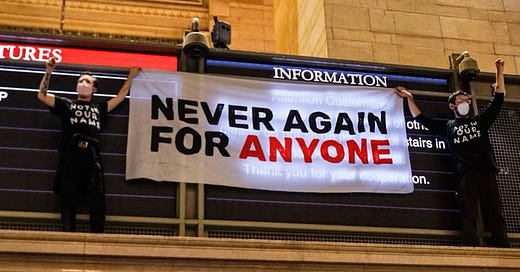"May every single building in Gaza be destroyed."
The message is posted in a WhatsApp chat put together by Jewish young adults in my community. Previously, the purpose of the chat had been to organize Shabbat softball games, find roommates, or share matzah ball recipes. Now, it has taken on a different tenor.
"I hope they die like dogs," writes someone I attended yeshiva with fifteen years ago.
It is October 8, a day after Hamas’ brutal attack on Israel. Passions are inflamed. Uncertainty and fear grips us all. Still, I am shocked at the vitriol that now floods my notifications as the Zionist machine kicks its ultranationalist rhetoric into high gear. Some people in the chat gently push back on the most genocidal comments but are swiftly accused of "standing with these barbarians." In essence, to oppose a genocidal response by Israel is to be a traitor. To oppose the collective punishment of all Palestinians, the destruction of an entire people, in retaliation for the deeds of a few, is to support antisemitism.
I consider a response, type some of it, then delete the text. I do not believe myself capable of offering any perspective without losing my temper. But I am not angry at those calling for genocide. Instead, a sadness with the molasses weight of exhaustion creeps through my body. All I can think is, "This is what Zionism does to a motherfucker."
Throughout my childhood, one sentiment was repeated so often, it was like a refrain: if the Arabs put down their weapons today, there would be no more violence, but if Israel put down its weapons today, there would be no more Israel. That quote, from former Israeli premiere Golda Meir, sums up the attitude of Zionism in a crude doublethink. Any violence aimed at Palestinians, no matter how cruel, is ultimately a move toward peace.
Zionist nationalism has formed apartheid barriers, walls of concrete and barbed wire, around Gaza and the West Bank, but it has also formed barriers in Jewish diaspora communities. For all the rallying cries of Jewish unity from the Zionists I grew up around, I have never felt more scared to exist as a Jew than I do in these spaces.
"You're sick. I don't understand how you can say these things. I love you. But I don't like you," a close relative says, and then she hangs up the phone. I have previously asked her how many Palestinian lives are equivalent to a single Israeli one. "All of them," was her response.
In Gaza, another Israeli bomb detonates in a refugee camp. Four weeks have passed since the Hamas attacks, and the death toll in Gaza has exceeded that in Israel by several orders of magnitude. Hundreds of Jews have been arrested in Washington D.C. and New York for protesting. A friend messages me to tell me about his step-father, an Israeli anti-Zionist, who cannot speak to his family for fear of becoming excommunicated. "Israel has divided Jews globally in a way that I worry is not reparable," he writes.
On social media, Jews opposing Palestinian genocide are called Kapo, a reference to Jews who were forced by the Nazis to act as guards in concentration camps. I post a call for ceasefire from the activist group Jewish Voice for Peace to my Instagram story and three childhood friends unfollow me. Others send DMs asking how I can support beheadings and rape. How many other innocents must die for those crimes, I ask? This is not important, I am told. Beheadings. Rape. Dead babies.
There is a silent admission in their protestations that the dead are only worth mourning on one side.
In the WhatsApp chat, the cries for blood have somewhat abated. Now, people are sending out invites to Hanukkah parties, celebrations of an ancient uprising within Palestine against an occupying force. This is the doublethink of Zionism, calls for death and calls for celebration both existing as if they can exist alongside one another. The logic of the occupation extends in all directions.
As Hanukkah approaches, anti-Zionist Jews will light our candles in opposition to apartheid, ethnic cleansing, and genocide, apart from a community that has chosen the statist goals of a rogue government over its own ancient values of justice. Moreover, we will refuse to be isolated or alone. Even amid this Zionist fervor, Jews, especially younger ones, are standing in greater numbers than ever before against the occupation and genocide of the Palestinian people. The conversations I've had with my Jewish friends who are finding a sense of justice for Palestine are more powerful and profound than any hate. I will light with them, and with my Palestinian comrades.
Solidarity now. Solidarity forever. Free Palestine.
—MAM




